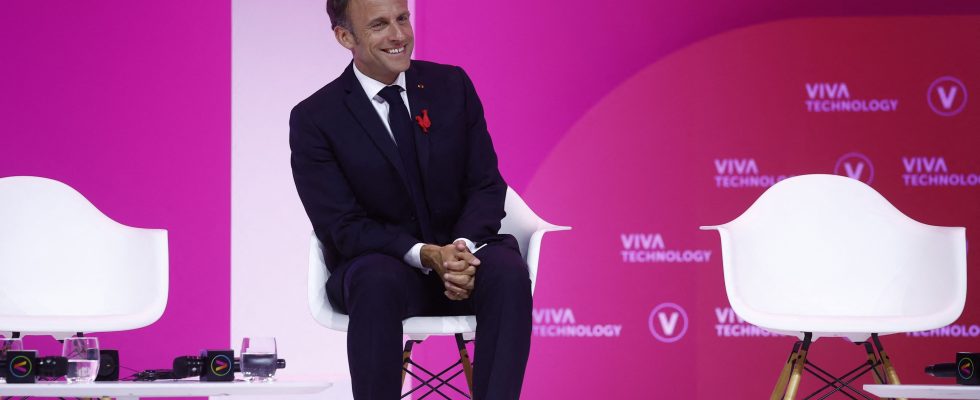The former boss of Google Eric Schmidt, the CEO of Nvidia Jensen Huang, the co-founder of Mistral AI, Arthur Mensch… tech big names are migrating to Paris this November 17 for Xavier Niel’s high mass on artificial intelligence, ai-Pulse. The sign of a profound change in atmosphere. Despite its leaders in maths and AI, France was taken a little by surprise in 2022 by the ChatGPT earthquake. A year later, it has redressed the situation and is being scrutinized with interest by the international AI community.
It is thus the only country outside the United States, where a company, Mistral AI, was invited to discuss regulation with American Vice-President Kamala Harris and UN Secretary General António Guterres during the international summit in Bletchley Park. All the other companies invited to this prestigious round table flew the American flag: OpenAI, Meta, Google/Deepmind, Anthropic and Inflection. Having placed a tricolor jersey in the skewer is therefore no small victory. Founded by Arthur Mensch, Timothée Lacroix and Guillaume Lample last April, the start-up Mistral AI has, it is true, quickly succeeded in establishing itself on the AI scene: the company has raised 105 million euros , and developed a first major language model. He’s not the only “Frenchie” to stand out in the sector. LightOn had the flair to pivot into generative AI in 2020, and specialized in business solutions.
Global laboratories and supercomputer
In recent months, other local gems have found themselves in the spotlight. Starting with Nabla. Its Copilot tool, capable of automating note-taking and writing consultation reports, aims to save time for doctors overwhelmed by administrative tasks. Tested by several hospitals in France and the United Kingdom, it has already convinced the American medical group Kaiser Permanente, which manages 39 hospitals and 600 care centers. Let us also mention the French Photoroom, a specialist in photo editing; Giskard in AI safety or Dust, co-founded by Stanislas Polu, former OpenAI engineer, and Gabriel Hubert, former product manager at Alan. Even the Americans are now more willing to consider setting up their base in Paris: this is the choice made by the co-founders of Poolside, which recently raised $126 million.
Why this craze? Because leading artificial intelligence laboratories have flourished in recent years in Paris. In 2015, the emblematic Facebook AI Research (FAIR) opened its doors in the capital under the leadership of Yann LeCun, one of the three “godfathers” of modern AI. And in 2018, the government went out of its way to encourage the start-up DeepMind, as well as its parent company Alphabet (Google), to successively open two other laboratories. “These AI research centers have been decisive in keeping our talents in France,” explains Willy Braun, co-founder of the investment fund dedicated to seed startups Galion. exe. Without them, many graduates of France’s prestigious master’s degrees in AI – such as the MVA (mathematics, vision, learning) at Saclay – would probably have had to leave for San Francisco to find positions at their level.
“Computing power is our other strength,” Guillaume Avrin, the national coordinator of the AI strategy, told L’Express in early November. Thanks to its Jean Zay supercomputer, France has already created the great Bloom language model. Among the approximately 800 million euros of investments in AI announced by President Emmanuel Macron this summer, 300 million will also be dedicated to increasing these computing capacities (including 50 million in the very short term to quadruple the capacities of Jean Zay). French nuclear power and the carbon-free energy it offers are another argument to which the AI sector, whose needs are growing, can be sensitive.
Of course, the gap between France and the US remains deep in artificial intelligence. “The big challenge is the difference in financial resources,” underlines Franck Sebag, partner at EY. If Mistral recently raised around a hundred million euros, OpenAI received from Microsoft… 10 billion dollars. New entrants, however, are finding ingenious solutions to this resource problem, relying in particular on the open source community. “Many are making astonishing progress, with far fewer resources than the initial players,” Mitchell Baker, president of the Mozilla Foundation, told us. And this leading voice of the web and the open source sphere clarifies: “We do not always need, or even have an interest, in using a large general-purpose language model trained on the best and worst of the Internet. In certain cases, it is preferable to have a tool trained on your company’s data only. And in this sector, small players have every chance against the big ones.”
Xavier Niel takes on AI
France therefore has some good cards to play. And with Xavier Niel, a heavyweight visibly ready to put chips in the game. As explained by the L’Express investigation published on Wednesday, the telecoms troublemaker launched his Iliad empire to attack this market in Europe. His three levers to get there? First, an artificial intelligence laboratory with 100 million euros whose team will be presented during the day. Then, Nebuchadnezzar, a supercomputer built on a thousand sophisticated chips (their list price is 36,000 euros each). Finally, its cloud backed by eight data centers (Scaleway and Free Pro). Arguments which allow us to better understand why tech stars such as the CEO of Nvidia flock to the Frenchman’s event.
